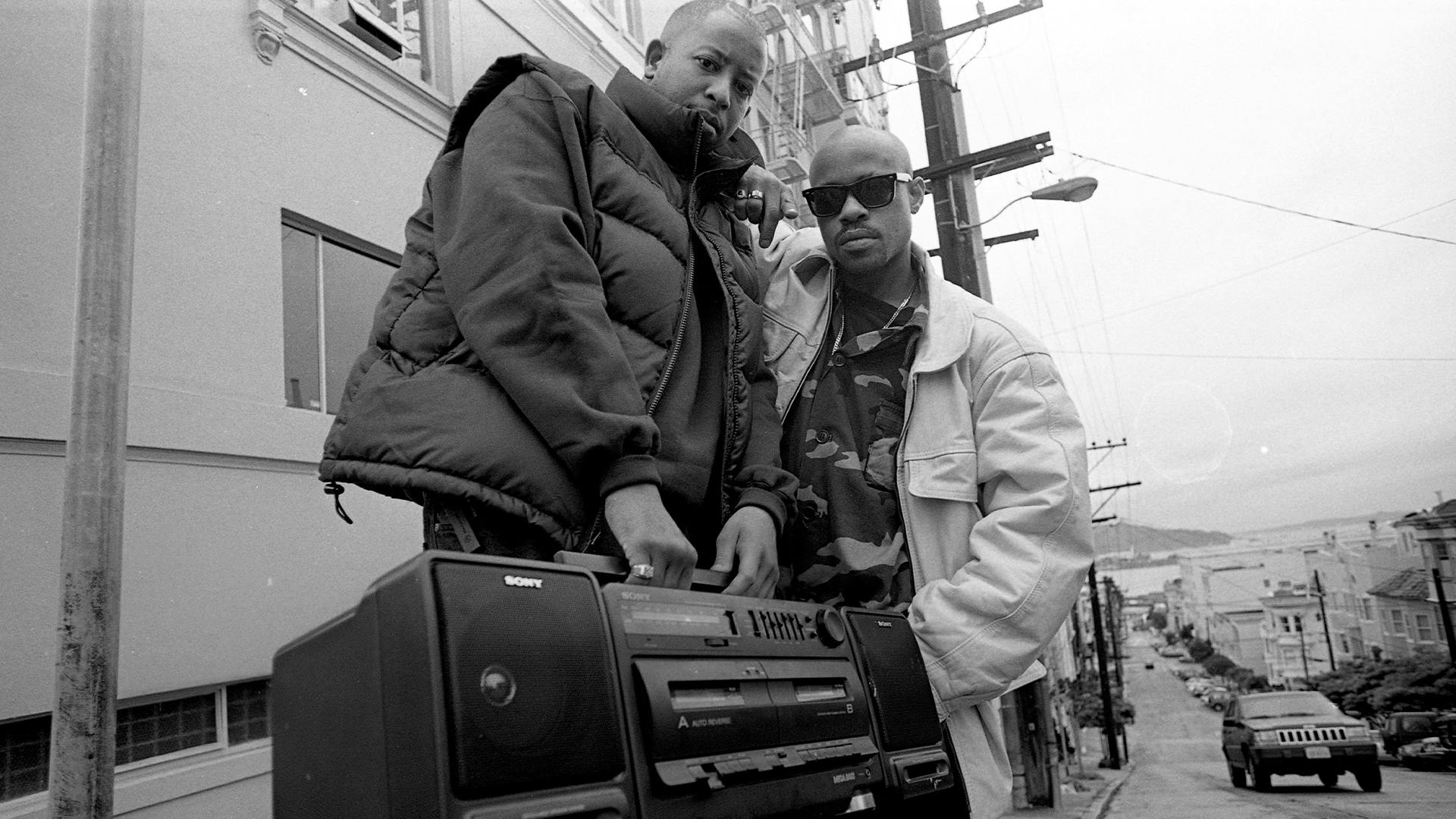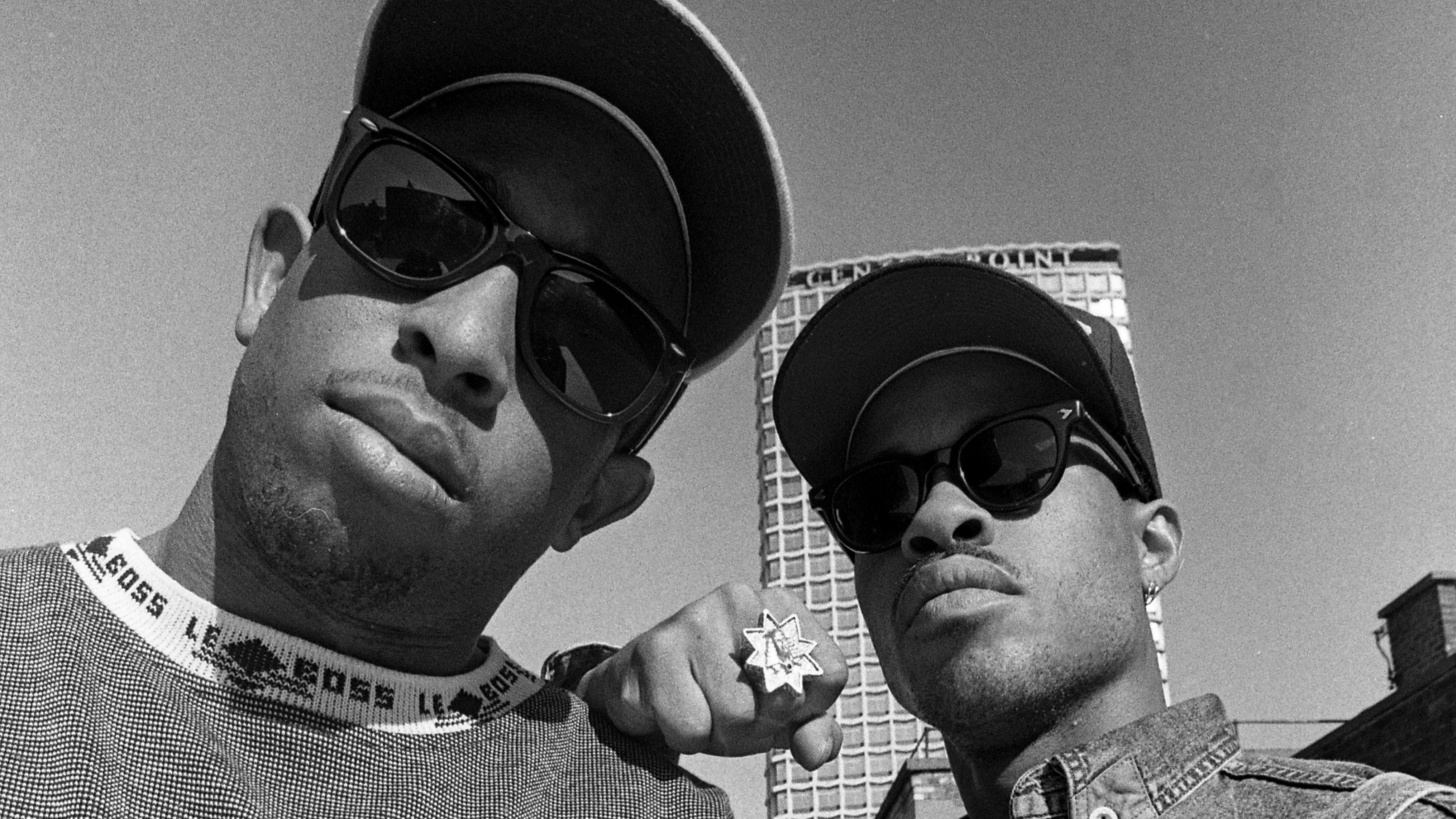
Classic Albums: 'Daily Operation' by Gang Starr
Classic Albums: 'Daily Operation' by Gang Starr
By Kevin Coval
Published Sat, April 2, 2022 at 12:00 AM EDT
It's bugged how time works. Gang Starr's third studio album, DAILY OPERATION, dropped 30 years ago, but listening again, it seems entirely possible no time has passed at all, a reminder Hip-Hop stays in the (Afro)future, and that Guru and DJ Premier were communicating from the flight cabin of a time machine.
In part, the timelessness of this record is because Premier, who in my opinion is the GOAT of sample-based producers, composes within a Black American lexicon, carrying the diaspora with him, dropping funkin lessons on every track. Daily Operation is not the most mainstream Gang Starr project, it peaked at #65 on Billboard whereas Moment of Truth went to #6 and #1 on the R&B charts. But in an extremely fresh, what i think of as a Midrashic way, Premier, the producer, resurrects the ghosts of Charlies Mingus and Cannonball Adderley, weaving them into vocal (re)arrangements of fragments from Aretha Franklin and Richard Pryor with references to peers and idols like MC Lyte and Boogie Down Productions.
There is thirty years of Black music and cultural production at Premier's fingertips and in his (non)exhaustive, encyclopedic mind. The tracks on Daily Operation help to solidify not only a golden-era sound, but a way of constructing instrumentation, opening the archives of Black American genius as a reintroduction to a younger audience. Hip-Hop is the best musical education on the planet rock because it uses the new to usher in, account for and recontextualize the ancestors. It might be part of the reason why sample-based culture has been so criminalized; it represents and maintains a powerful continuum, and the truth about the maintenance of a white-supremacist, capitalist culture is that is detests memory and forcibly, willfully promotes ahistorical amnesia.


Lyrically, the narrative of Daily Operation is a blueprint for where Hip-Hop, youth culture, and Brooklyn was and was headed. There is the "chick song," as Guru would offhandedly say, the second single, "Ex-Girl to Next Girl," lamenting the love and loss of a young bon vivant. Posted on the block in the video, Guru dawns an all-purple Fila windbreaker suit and matching Clyde’s (possibly styled by the Queen of Streetwear, April Walker, who is credited in the album's linear notes) proclaiming, as the beat drops out, "wherever my beamer goes, you know that I'm drivin."
There are the braggadocios proclamations and acute aesthetic arguments the group makes in a still nascent, evolving artistic practice, when Guru and Premier were roommates in Bed Stuy and, "saw each other literally every day for like five, six years." as Premier reminisces in The Fader in November of 2019.
On "Flip the Script," Guru astutely calls out the crew's "streetwise poetry and turntable wizardry," as always paying homage to his partner's scratching instrumentation, a technique I long for thirty years later. He calls out the eternal villain and accumulator of so much lyrical vitriol, one of the music's greatest tropes, who unfortunately returns perpetually; the wack emcee, stating, "I couldn't make out what you were saying/ Your diction is jumbled whereas me I'm conveying /Clear thoughts, to a crowd that's most critical."
DROP YOUR EMAIL
TO STAY IN THE KNOW
And indeed in '92, there was low tolerance for the wack.
The culture was vehemently allergic to it. On "Take it Personal", the first single off the project, Guru takes up for himself, his DJ, Black artistic freedom and for a culture of collage remaining unfettered to explore, invent and grow without being policed. He rhymes, "Rap is an art, you can't own no loops / It's how you hook 'em up and the rhyme style troop... I flip lines and rhymes that never sound like yours / there ought to be laws against you yapping your jaw".
In landmark cases, a year or two prior, against De La Soul and Biz Markie, the practice of sampling was on trial and became patrolled and increasingly costly and difficult to utilize. Guru and DJ Premier actively challenged those notions and laws, though they cleared their more obvious samples, by continuing to practice referencing, borrowing and quilting. Sampling is an African diasporic practice miraculously channeled through time, electricity and the SP-1200. Their defiance of "ownership" is an act of resistance to the predominantly white-run record labels and archaic, generational ideas about what constitutes music and who gets to create it, as well as a form of class resistance from a generation whose art programs and music classes were quick to be cut in a grand disinvestment from public education in the Reagan and Bush 1 regimes.
So aesthetically, Daily Operation, is tactical. A ritual on the regular. The work wear rocked for reason. The mere existence of Black and Brown and multi-ethnic working-class communities creating, represented (now and at the time), a challenge and counter narrative about who and what demographics are deemed worthy to make art, music, language and culture. And we are lucky enough to live in a moment (of truth) where Gang Starr are some of the world's foremost creative practitioners.
Daily Operation is also a formal introduction of the group's boarder community of collaborators, namely Lil Dap and Jeru The Damaja, who appear on the track "I'm the Man", over three different instrumental changes in this masterfully crafted DJ Premier movement. We would hear the trio again an album later, in 1994, on Mass Appeal's "Speak ya Clout". But in '93, it was Jeru who would help to usher in a second wave of East Coast stomping resilience with his breakout smash single, "Come Clean", whose unforgettable beat would drip drop through a speaker and turn every party out. The track, of course, produced by DJ Premier.
But the lasting significance and contribution of Daily Operation, might be, because it's a snapshot/time capsule of a pre-gentrified Brooklyn in the midst of a Black cultural renaissance. Brooklyn was changing, like any city is constantly and enduring its share of issues, but Brooklyn was also often, aptly called, Medina, because of the reverence and innovation of the 5% Nation. An American Medina (to quote homie and scholar Eboo Patel), where Black bohemia gathered to continue to grow a culture that would influence the world. Spike Lee set up his production company down the street from where intelligentsia like Greg Tate (who i can't believe is gone and will never be), Nelson George, a young Joan Morgan, would brunch and spawn the field of Hip-Hop journalism. Brooklyn emcees and poets like Saul Williams, Mums (Rest in Poems) and Detroit transplant Jessica Care Moore, would gather at the Brooklyn Moon Cafe to create a home for a new kind of Breakbeat poetics. The Brownstone-lined streets called Common, Dilla and provided the fertile artistic space Mos Def and Talib Kweli needed to start a set at Nkiru Books.
Premier and Guru are of course transplants themselves but isn't it sometimes the outsider that has perspective and insight on what makes a place so special and unique. Someone who can lend a new lens on terrain that has become common place and hold it up, in new light, where even long-time inhabitants are awed at its beauty.
The crowning achievement of Daily Operation is, perhaps, Guru's love letter to the borough, "The Place Where We Dwell." Hip-Hop pre-internet is, foundationally, a poetics of place. On Guru's ode to his adopted home, he says, "On the subject of Blackness, well, let me share this / Brooklyn is the home for cultural awareness / so in all fairness you can never compare this." The sentiment is beautiful, but the wordplay is brilliant. The double entendre of "fairness" here, alluding to equity and race, is representative of a political, maturation Hip-Hop and these young men in their late 20s and early 30s, in particular, were going through.


Daily Operation is the first album, maybe the first place anywhere, i heard the term, "whiteness" (on the incredibly dense and prophetic song, "Conspiracy.") Whiteness as a term, as an idea, for a young white person, participating in and consuming Black cultural production was very useful. Very quickly, when I heard and thought about the term, it allowed me to unlock the understanding that this is a systemic critique of historic inequity and did not paralyze me into inaction and guilt. I thought, "the onus is on us." A continued invitation, and sometime demand, to lean in and learn and educate myself; Hip-Hop's ingenious pedagogic tool of promoting and praising the autodidact.
The album, recorded thirty years ago at D&D Studios, the house Preemo built, is also where Illmatic was created and Biggie, Jay, KRS, and other luminaries, all touched the mic. But the camaraderie and love Gang Starr have for the craft and one another, is still visceral, preserved on wax, for the world and Brooklyn the Planet, to hear in laced up Tims, perhaps rolling a blunt, and head nod in affirmation as the beat knocks on and on and on.






